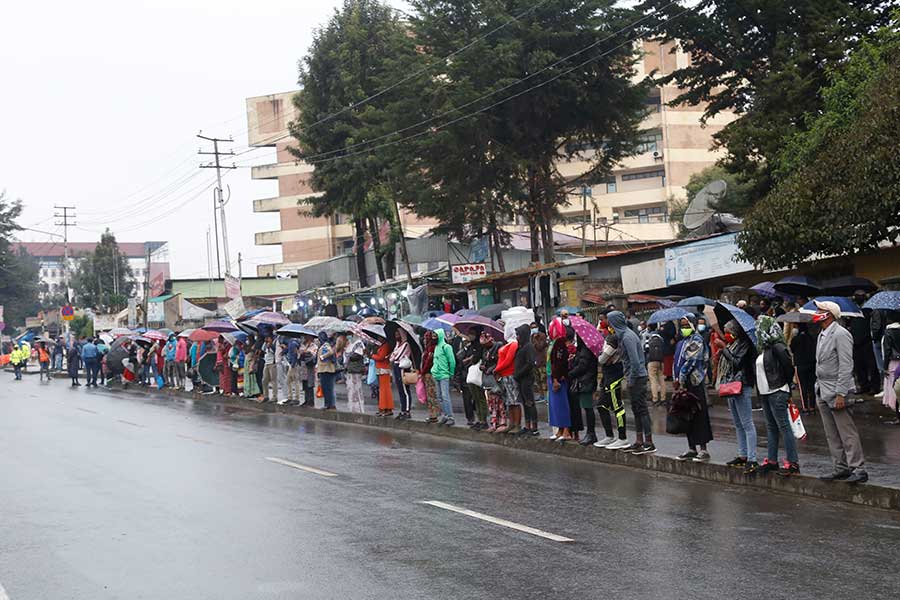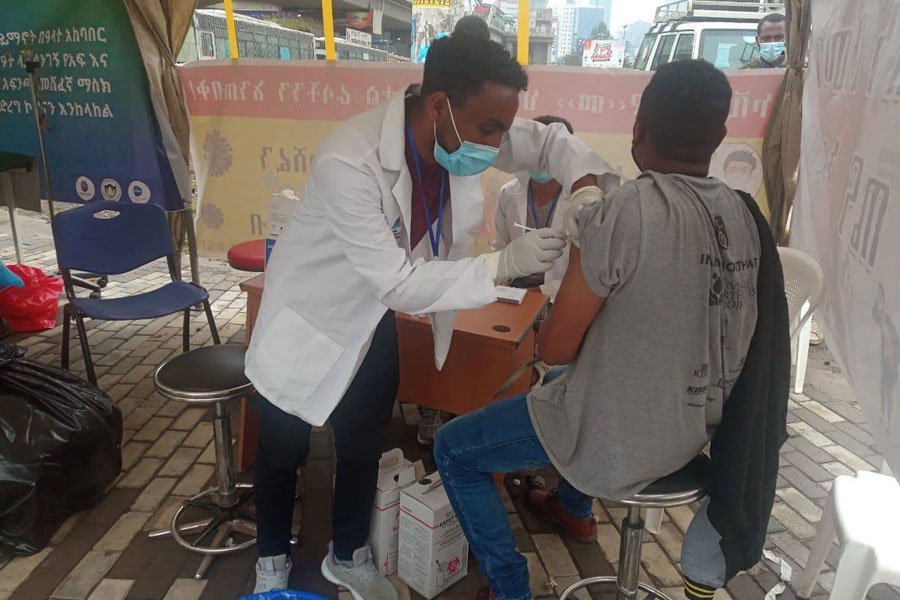
Eyasu Mekonnen, 35, has spent almost one-third of his life in the legal business working as a representative for different companies and as a practicing lawyer. He earned his first and second degrees in law from Haremaya and Addis Abeba universities, respectively.
After serving as a legal practitioner at various organisations, including TK Law Office and the Information Network & Security Agency (INSA), four years ago he joined two friends that have started FLS Law Office.
During the course of his decade-plus career, he has never experienced a slow business season like this one after all the federal and regional courts were partially closed after the Novel Coronavirus (COVID-19) pandemic was reported in Ethiopia. Since then the legal sector, including Eyasu’s firm, has been significantly affected.
As the world is reshaped by the COVID-19 pandemic, many sectors are encountering changes. Even once the pandemic becomes the new normal, the effect on the sectors will be diverse. Over 13 million individuals across the globe have contracted the virus, and it has taken the lives of over 590,000 people.
The crises that are caused by the virus have impacted most global sectors tremendously. It has led many companies and organisations to lay off employees, while others have let their employees work from home. It has disrupted the supply chains of various products and services and forced many of the international airlines to ground their fleets and limit flights.
As COVID-19 continues to hamper the global economy and up-end business as usual, many law firms across the globe are grappling with the big questions of how to move forward, promote sustainability and continue to service their clients. Meanwhile, the legal industry in the United States has plummeted to a nearly 20-year low, sparking layoffs and furloughs at firms.
Since the pandemic set foot in Ethiopia in March, the government has taken various actions to contain the spread of the virus, including closing schools, banning public gatherings, cutting the number of passengers in public transport facilities and also the partial closure of the courts. Since mid-March, the courts have been closed except for urgent cases and cases that have reached the final ruling stage.
The Federal Supreme Court first partially closed the courts on March 19, 2020, and since then it has extended the closure three times so that now courts will not reopen until July 17, 2020. The main aim of the closure, according to the Supreme Court, is to maintain the safety of judges, court employees and their families as well as the community at large.
On March 18, 2020, the Federal Supreme Court announced the first phase of the partial closure of courts that spanned 23 workings days. On April 1, the closure was extended by another 23 working days. The latest extension was announced on May 10 for an additional 27 working days.
For almost four months, the courts were only hearing cases related to domestic violence, cases pertaining to human rights, the safety and security of the country, labour and employment cases, divorce cases, crimes against women and children, as well as the implementation of the state of emergency that was declared to contain the spread of the virus.
Eyasu, who is married and a father of two children, has been working as a lawyer representing his clients at all court levels. But now he is only giving counselling services after the closure of the courts and receiving a much lower overall income.
“I’m over depending on the consultancy service,” he told Fortune. “I used to earn enough income."
He used to earn most of his money through court cases with an average monthly income of 30,000 Br.
While hitting lawyers hard, the impact of the virus is relatively better on corporate lawyers, large law firms that work as in-house counsels assisting companies in every legal aspect.
The current situation pushed many lawyers including Eyasu to turn to legal counselling businesses as a means of survival in this dire situation.
Even the revenue the lawyers generate from their legal counselling services is not enough for survival, according to Yeshiwas Eyasu, an attorney and consultant at law for over a decade.
“The income generated from consultancy services is not more than 10pc of the total income of lawyers,” he said. “It is a manifestation of our income based on court cases.”
Even though the effect of the pandemic is knocking on the doors of all organisations, some sectors are getting back on track since various governmental and non-governmental organisations are re-opening their doors. However, for the business of lawyers to recover, the courts would have to reopen.
The closure not only poses a threat to the livelihoods of the practitioners, according to Eyasu, who says that it could potentially lead to the rise of crime and injustice in the country.
“The Federal Supreme Court should see and evaluate the consequences followed by injustices observed in different corners of the country,” said Eyasu.
Bisrat Teklu, a 32-year-old lawyer, agrees, saying that the closure of courts is affecting citizens who seek instant legal advice.
A father of one, who used to serve as a lecturer as well as a lawyer for the past seven years, has also fully switched his business to the consultancy service after he and his family felt the burn of the income decline.
“All lawyers who based their income on court cases are left stranded,” said Bisrat. “Especially lawyers who joined the law industry recently - they are facing challenges in covering their daily expenses.”
Rather than the court hearing processes, the manual system used at courts, especially the information and document records system, can highly expose the employees and the public to the pandemic, according to Bisrat.
While resuming court sessions, the government can potentially prevent the spread of the virus by considering various types of technological components, according to Eyasu.
“At any cost, each bench should automate their systems, like digitising the paper-based activities such as charges and suits, statements of defence and rulings,” said Bisrat.
Bisrat also says that the courts should start presiding over cases that involve pregnant women, old people, other health conditions and people with disabilities by strictly following safety guidelines and precautions.
In a country with 100-plus million people, there are only 350 judges who are working at the federal level of courts. There are about 4,845 lawyers licensed to operate in the country.
The court closure and extensions have been made based on information and guidelines coming from the Ministry of Health on the spread of the virus, according to Tesfaye Neway, spokesperson of the Federal Courts and vice president of the First Instance Court.
“It’s the first move to protecting the health of employees,” said Tesfaye.
The government is trying to balance two things: one is the judicial service and the other is the health of staff and judges, according to Tesfaye.
“We have many backlogged cases waiting their turn,” Tesfaye told Fortune.
Officials also claim that currently the federal courts are not fully capable of serving all clients in terms of providing personal protective equipment for each customer and employee.
Last week, an association of lawyers filed a letter to the Federal Supreme Court calling for the resumption of court sessions, stating that their businesses have been significantly affected.
“Currently, we are in the process of preparing a draft protocol on how judicial training should be given and how clients should be served,” said Tesfaye.
The recommendation of digitising the court system is hard to apply during the current situation, according to Tesfaye.
“It’s difficult giving service through technological components with low information communication technology infrastructure,” said Tesfaye.
The virtual system should be created in order to get back to the normal court process, and the government should consider tax extensions for the practitioners at least for one year, he recommended.
Even though decision was good in terms of preventing the transmission of the virus, lawyers have been highly impacted by the changes, and the government should think of a way to help out the sector, according to Aschalew Ashagre, assistant professor of law at Addis Abeba University.
"The measure taken by the government in preventing the transmission of the virus is good," said the expert, "however, the measures should not suppress sectors that are very essential."
The federal courts are set to be re opened on July 20, 2020, after a partial closure that lasted four months. The courts will be re-opened in three stages, in July, August and September, following a guideline prepared by the Supreme Court.
The courts will hear cases related to prisoners and cases close to being finalised according to their appointments in July. Permanent benches like labour, disturbance, women and children will be restored, while cases at the stage of evidence and charges will be postponed to the next year unless the judges deem then necessary to proceed. In August, the courts will start accepting new charges, appeals and execution.
The usual rest time of the judges has also been pushed to September, except for cases labelled urgent and necessary like human rights, enforcement of the state of emergency, family matters and speedy trials.
The cassation bench will only entertain cases from Addis Abeba, and executions will begin except for eviction and bidding.
Editors Note: This story has been updated on July 25 2020
PUBLISHED ON
Jul 18,2020 [ VOL
21 , NO
1055]

Radar | May 07,2022

Radar | Jan 29,2022

Sunday with Eden | Sep 18,2021

Sunday with Eden | Jan 29,2022

Featured | Sep 06,2020

Covid-19 | Sep 04,2021

Featured | Nov 13,2021

Fortune News | Apr 25,2020

Commentaries | Oct 16,2021

Radar | Oct 12,2019

Dec 22 , 2024 . By TIZITA SHEWAFERAW
Charged with transforming colossal state-owned enterprises into modern and competitiv...

Aug 18 , 2024 . By AKSAH ITALO
Although predictable Yonas Zerihun's job in the ride-hailing service is not immune to...

Jul 28 , 2024 . By TIZITA SHEWAFERAW
Unhabitual, perhaps too many, Samuel Gebreyohannes, 38, used to occasionally enjoy a couple of beers at breakfast. However, he recently swit...

Jul 13 , 2024 . By AKSAH ITALO
Investors who rely on tractors, trucks, and field vehicles for commuting, transporting commodities, and f...

Jun 28 , 2025
Meseret Damtie, the assertive auditor general, has never been shy about naming names...

Jun 21 , 2025
A well-worn adage says, “Budget is not destiny, but it is direction.” Examining t...

Jun 14 , 2025
Yet again, the Horn of Africa is bracing for trouble. A region already frayed by wars...

Jun 7 , 2025
Few promises shine brighter in Addis Abeba than the pledge of a roof for every family...